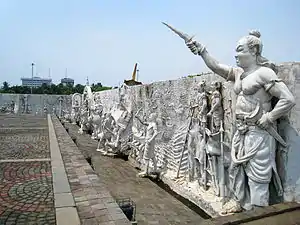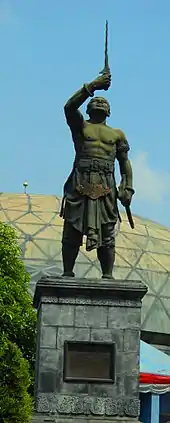Palapa oath
The Palapa oath (Indonesian: Sumpah Palapa) was an oath taken by Gajah Mada, a 14th-century Prime Minister of the Javanese Majapahit Empire described in the Pararaton (Book of Kings). In this oath Gajah Mada swore that he would not taste any spice, as long as he had not succeeded in unifying Nusantara (the Indonesian archipelago). The oath was taken during his inauguration as Majapahit Amangkubhumi (Prime Minister) that took place in 1256 Saka (1334) or 1258 Saka (1336).[1]

The oath
The main source of the Palapa oath is taken from the middle Javanese manuscript, Pararaton, which states:
- Sira Gajah Madapatih Amangkubhumi tan ayun amuktia palapa, sira Gajah Mada: "Lamun huwus kalah nusantara isun amukti palapa, lamun kalah ring Gurun, ring Seran, Tañjung Pura, ring Haru, ring Pahang, Dompo, ring Bali, Sunda, Palembang, Tumasik, samana isun amukti palapa".
Translation:
- He, Gajah Mada Patih Amangkubumi, does not wish to cease his fasting. Gajah Mada: "If (I succeed) in defeating (conquering) Nusantara, (then) I will break my fast. If Gurun, Seram, Tanjung Pura, Haru, Pahang, Dompo, Bali, Sunda, Palembang, Temasek, are all defeated, (then) I will break my fast.".
Interpretation
The term palapa is an Old Javanese term for "coconut". It also might be used to refer to pala (nutmeg) to describe "spices" or flavourings in food. Palapa can also be interpreted as the combination pala-apa, which means any fruit or spices. The oath means that Gajah Mada would not eat palapa until he succeeded in uniting the Nusantara archipelago under Majapahit suzerainty. Historians have interpreted that Gajah Mada might have performed what is now known in Javanese tradition as puasa mutih, only consuming plain food of white steamed rice, plain vegetables and clear water, without any coconut or spices for flavouring. Some might also interpret this to mean Gajah Mada was somehow performing a somewhat ascetic ritual by refusing to indulge himself in sensual pleasures, which includes consuming spiced flavoursome food. This oath was probably meant to describe his seriousness and strong will in achieving his goal of furthering the glory of Majapahit.
From this manuscript, historians have learnt several names of places and polities in Nusantara at the time the oath was taken, which were not under Majapahit suzerainty, and were targeted by Gajah Mada's ambitious expansive campaign.
Places described in Palapa oath

- Gurun = Gorom island, east of Seram
- Seran = Seram
- Tañjung Pura = Tanjungpura Kingdom, Ketapang Regency, West Kalimantan
- Haru = Aru Kingdom North Sumatra (Karo)
- Pahang = Pahang, Malaysia
- Dompo = Dompu in Sumbawa island
- Bali = Bali
- Sunda = Sunda Kingdom
- Palembang = Palembang or Srivijaya
- Tumasik = Singapore
Legacy
The Palapa oath is used as the name of the Indonesian telecommunication satellite Palapa, a Boeing-made satellite. The program was started in February 1975 and the satellite was launched on 9 July 1976, from Cape Caneveral, United States. The name Palapa was chosen by President Suharto and means 'fruits of labor', also signifying the Indonesian effort to unify the Indonesian archipelago through telecommunication technology.
See also
References
- Sita W. Dewi (9 April 2013). "Tracing the glory of Majapahit". The Jakarta Post. Retrieved 5 February 2015.
